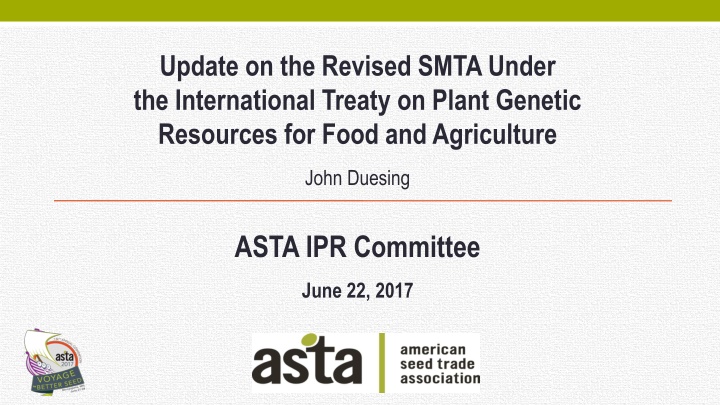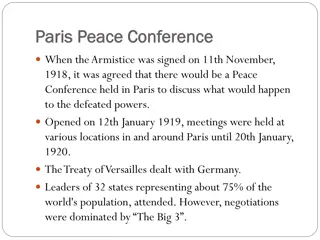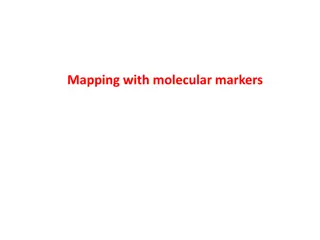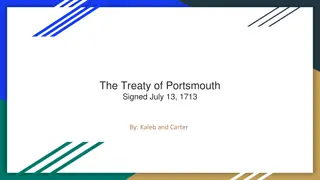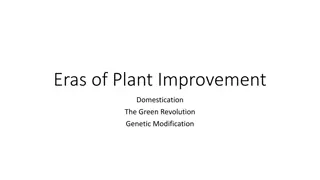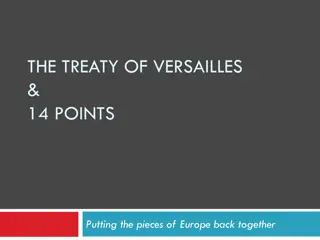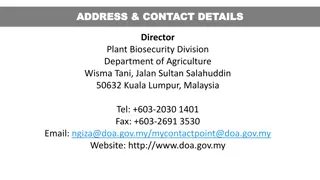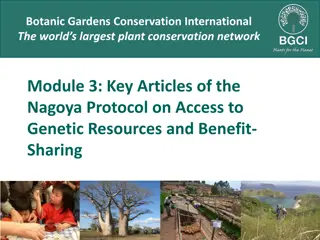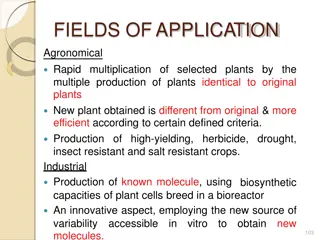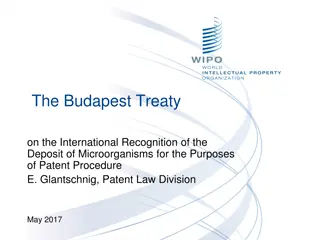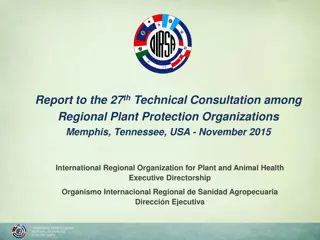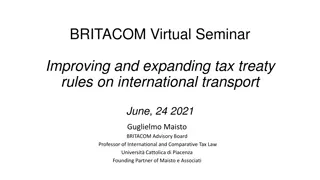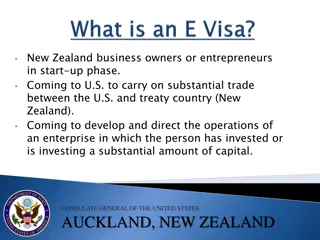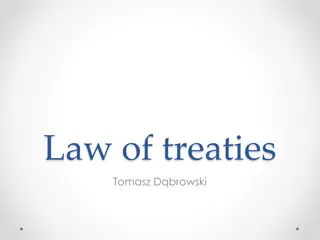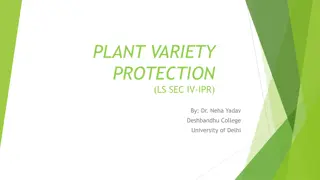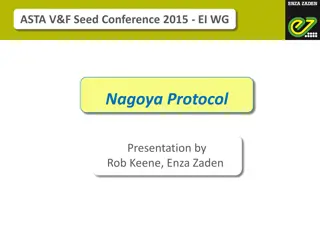Update on International Treaty on Plant Genetic Resources for Food and Agriculture
The International Treaty on Plant Genetic Resources for Food and Agriculture aims to establish a system compatible with CBD, conserve and sustainably use genetic resources, and ensure fair benefit-sharing. However, there are challenges with the current Standard Material Transfer Agreement (SMTA) and Benefit Sharing Fund (BSF) as industry uptake is limited, leading to insufficient benefit payments. Some contracting parties are withholding germplasm until receiving payments, and important crops are missing from Annex 1.
Download Presentation

Please find below an Image/Link to download the presentation.
The content on the website is provided AS IS for your information and personal use only. It may not be sold, licensed, or shared on other websites without obtaining consent from the author.If you encounter any issues during the download, it is possible that the publisher has removed the file from their server.
You are allowed to download the files provided on this website for personal or commercial use, subject to the condition that they are used lawfully. All files are the property of their respective owners.
The content on the website is provided AS IS for your information and personal use only. It may not be sold, licensed, or shared on other websites without obtaining consent from the author.
E N D
Presentation Transcript
Update on the Revised SMTA Under the International Treaty on Plant Genetic Resources for Food and Agriculture John Duesing ASTA IPR Committee June 22, 2017
International Treaty on PGRFA - Intro Primary Objectives: Establish a system for PGRFA compatible with the CBD (1993). Ensure conservation and sustainable use of PGRFA. Secure fair and equitable sharing of benefits from use. = multilateral system (MLS) for access & benefit sharing. Treaty entered into Force: June 29, 2004 2
International Treaty on PGRFA - Intro Contracting Parties: 138 countries and the European Union. U.S. formally joined in March 2017. Not members: China Colombia Mexico Russia S. Africa Thailand Ukraine Vietnam 3
International Treaty on PGRFA - Intro Genera and crops included in Annex 1 of the Treaty Apple Asparagus Banana / Plantain Barley Bean (Phaseolus) Bean/Vetch (Vicia) Beet Brassica complex Breadfruit Maize Major aroids Millet, Finger Millet, Pearl Oat Pea Pigeon Pea Potato Rice Rye Sorghum Strawberry Sunflower Sweet Potato Triticale Wheat Yams Carrot Cassava Chickpea Citrus Coconut Cowpea et al. Eggplant Grass pea Lentil 35 food crops and 29 forage crops 4
International Treaty on PGRFA Current SMTA Standard Material Transfer Agreement: effective January 2007 Established terms for facilitated access under the MLS. Defined conditions to make monetary benefit-sharing payments. Payments for Products derived from MLS Material accessed: 6.7 1.1% on Sales of Product (-30%) if sold with restriction on further research and breeding (e.g., utility patents) 6.8 Voluntary when Product is sold without restriction on further research and breeding (e.g., PVP or no IPR) 5
Impasse with Intl Treaty, Current SMTA & BSF Treaty, MLS and SMTA are not working as intended. Limited use of SMTA by industry and no use of Subscription System (6.11). SMTA not generating sufficient (any?) payments for Benefit Sharing Fund. Benefit Sharing Funds not meeting Governing Body expectations. Contracting Parties are not releasing MLS germplasm as required. Contracting Parties withholding MLS materials until they see the money . Annex 1 does not contain all important commercial crops. 6
International Treaty on PGRFA Annex 1 15 of the top 35 global crops are missing from Annex 1 Cocoa Oil palm Cotton Olive Date Onion Grape Paprika Peanut Pear Pineapple Sesame Soybean Sugar cane Tomato Other crops missing Alfalfa, Coffee, Cucumber, Flax, Lettuce, Melons, Prunus, Pumpkin, Squash, Spinach, Tea and Watermelon 7
Intl Treaty Working Group Established in February 2013 Governing Body formed and tasked a WG to develop a range of measures: To expand the list of Annex 1 crops; To increase user-based payments and contributions to the Benefit Sharing Fund in a sustainable and predictable long-term manner; and To enhance the functioning of the MLS System by additional measures. Seven Working Group meetings since 2013. No consensus yet on a final report for the Governing Body to consider at its 6th Session in November 2017. Ad Hoc Open-ended Working Group to Enhance the Functioning of the Multilateral System of Access and Benefit-sharing of the Treaty 8
Intl Treaty on PGRFA Industry Engagement ISF Sustainable Ag Committee (SAC) regularly engaged in Treaty work. Bernice Slutsky, Tom Nickson and John Duesing represent ASTA on SAC. ASTA Access and Benefit Sharing (ABS) Working Group provides direction. Anke van den Hurk (Plantum) and Tom Nickson are SAC co-chairs. Anke and Tom are the official ISF representatives to Treaty negotiations. SAC formed a subgroup to track and respond to Working Group activities. 9
Proposed and Pending Primary Conditions for Revised SMTA 1. Subscription System with annual payments to access germplasm. 2. Annual payment based on rate times total revenue (-30%) for all Annex 1 crops. 3. Annual payment rate not indicated. 4. Surviving rights after termination not specified. 5. Subscriber may bring prior and active SMTAs under the new Subscription. 6. Co-Chairs favor new Subscription System as only option to access germplasm; current single access mechanism would be removed. 7. Governing Body can make unilateral changes in terms of SMTA and Subscription. 10
ISF Positions - Most Critical Conditions for Revised SMTA 1. Annual Subscription rate at 0.01% of revenues for all Annex 1 PGRFA crops (-30 %). 2. Paid-up right to sell Products after Subscription termination if 10 annual payments made. 3. Surviving rights to continue developing Products from Materials accessed. 4. Post-termination conditions apply to prior SMTAs rolled into Subscription. 5. Retain current single access mechanism in addition to new Subscription system. 6. Fully paid subscription ensures compliance with Nagoya during and after Subscription term for any products derived from PGRFA accessed during the Subscription term. 7. Governing Body must develop and execute a plan to expand number of Annex 1 crops. 11
Adding Crops to Annex 1 of the International Treaty Swiss Gov t proposal to Governing Body to amend Annex 1 to cover all PGRFA. Governing Body may not have absolute authority to add new crops to Annex 1. Adding new crops to Annex 1 requires an amendment to the Treaty. Contracting Parties may need to deposit new instruments of ratification, acceptance or approval for the Treaty and amendment for Annex 1. CP s may have no interest or political will to re-ratify or approve the amendment. Could take 3-5 years before of the Contracting Parties deposit their instrument. 12
International Treaty on PGRFA Next Steps ISF will communicate its Statement to Seed Associations & other stakeholders. Contracting Parties need to understand how terms and conditions for the Subscription System must make business sense to be attractive. ISF SAC members will represent the Seed Industry in the next sessions of the Working Group in Q3 2017 (to be scheduled); and the Governing Body in late October/early November 2017. ASTA representatives will maintain contact with U.S. Gov t to ensure they know seed industry views regarding the new SMTA and adding new crops to Annex 1. 13
International Treaty on PGRFA Summary ASTA is actively engaged in current negotiations to enhance functioning of the Treaty through the ASTA ABS Working Group. It is likely the new SMTA will be finalized by the end of the year. The final terms and conditions of the SMTA will determine whether seed companies decide to enroll in the Subscription System. A single access mechanism might be retained through strong outreach efforts to Contracting Parties supportive of the seed industry. It seems that adding new crops to Annex 1 could require 3-5 years. 14
